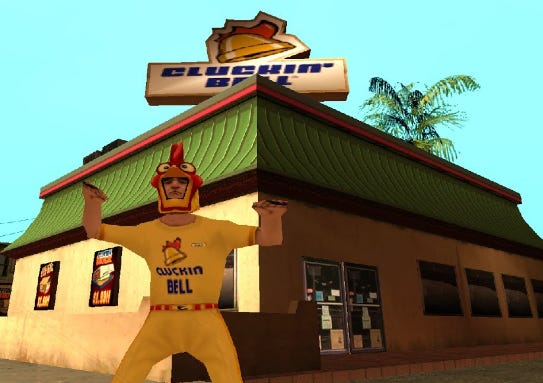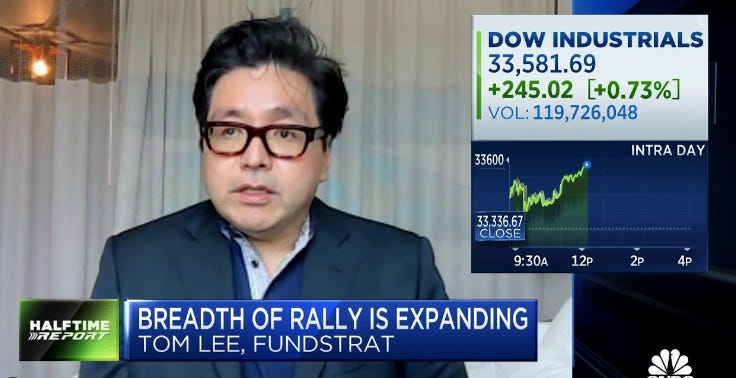Headless Market Chickens, Cluckin' Like Crazy
You're either with me or you're with the legacy financial media. Neither one of us knows what we're talking about - but hey, at least I admit it.
In the video game world, an NPC, or Non-Playable Character, is a term to describe a character that not controlled by a player. These characters are designed to perform specific roles and do exactly what the programming tells them, generally with minimal interaction to “active” characters playing the game. If video games were a movie, they’d be the extras. The term has also been adopted in broader contexts to describe individuals who appear to follow a script or lack independent thought.
To honor the upcoming release of the new Grand Theft Auto, here’s one of my favorite NPC’s at one of my favorite in-game locations — an employee at a franchise that’s as American as the GTA series itself — the Cluckin’ Bell, a satirical fast food restaurant that juxtaposes KFC and Taco Bell into one beautiful new brand.
In the world of the stock market, Non-Playable Characters are similarly mindless: they are either voluntarily inactive in the market, having invested with a manager or in passively traded funds, or they are active traders that are so lobotomized by the drivel in the financial media that they might as well not be participating. I like the above NPC because I think of passive stock market investors like headless chickens, pecking and clucking their way around aimlessly while eating whatever they are fed. Because after all, “animal spirits” are what keep the market going up, right?
Yet here I am pontificating after getting all of my prognostications about 2023—namely, thinking the economy would seize up and markets would crash at some point—dead wrong. And the headless market chickens are enjoying more than a 20% gain in the S&P 500 for the year. It's years like this that I think about standing squarely behind a mule at a rural southeastern Pennsylvania farm, poking it with a stick, waiting for it to kick up its back legs, and allowing it to strike me directly between the eyes in hopes that I will destroy half my brain cells and make myself capable of not overthinking markets.
But you and I know that this isn't going to happen, and instead I will continue to perpetuate Albert Einstein’s definition of insanity—doing the same thing over and over again, and expecting different results—for such time until I am eventually proven right, or eventually die, whichever comes first. Hey, at least if you have a lifetime subscription to the blog, you know what to expect.
But seriously, I want to review again what the potential long thesis for the stock market could be today, on the second week of December 2023. Over the last few days, the market has been rallying on lower inflation expectations and a continued belief that the Federal Reserve is going to cut rates next year. I continue to believe that neither of these things is going to make a significant positive difference because the damage to the economy has already been done — we just haven't seen it play out all the way yet. When it does, and we see massive deleveraging and/or a deflationary depression, with the housing market and financials under severe stress, the market will reveal that under the surface, it is far less resilient as it has appeared to be over the last few years.
If you're going long on the market here, the only actual long thesis that makes sense to me would be expecting an inflationary crack-up boom, where valuations are disregarded and thrown to the wind once and for all in favor of everybody buying into a system where the Fed prints money and buys bonds and stocks until we reap the consequences of defiling the corpse of the US dollar. In that case, historical norms about valuations would no longer be relevant and all of the metrics showing the market as overvalued—and there are many—would be meaningless.
Of course, in that situation, the real long-term and negative effects of a nation monetizing its own debt would become alarmingly evident and would result in far bigger problems than a couple stock market hiccups.
The headless market chickens passively investing in ETFs and rooting for stocks to go up on a daily basis without any rhyme, reason, or semblance of logic (see Exhibit A below) would love this situation.
Why? It gives the government and the central bank carte blanche to implement increasingly destructive policies under the guise of doing virtuous things. If you’ve got all your money in a stock market ETF, and you are beyond your prime years of speaking up, being an activist, and generally “starting shit” about issues that matter, this is the ideal situation for you. It might buy you 10 or 20 more years, but after that, it’ll likely lead to the long-term destruction of our country's economy and currency.
On the other hand, if you are actively taking price targets from Tom Lee and CNBC seriously, you’re probably already beyond help — and you’re definitely not reading this article or blog.
If we wind up staying within the confines of history at all, the market is severely overpriced, no matter how you look at it. This means that if we choose not to solve all of our problems by printing money, and instead actually try to implement spending cuts and hawkish fiscal and monetary policy, the economy is going to be toast for a while, and the stock market will be right behind it. And now, I will take an obligatory pause for laughter, because you and I both know that nobody in government or at our central bank has the backbone to implement such policy. This is great news for the headless market chickens and terrible news for active players in the market and people with one foot still firmly in the common sense camp, like you and me.
But fear not: I still think there will be a way we can brag to our friends at the local watering hole that we were right before bowing out and letting Rome burn in the background. Here’s how I see it playing out in 2024.





